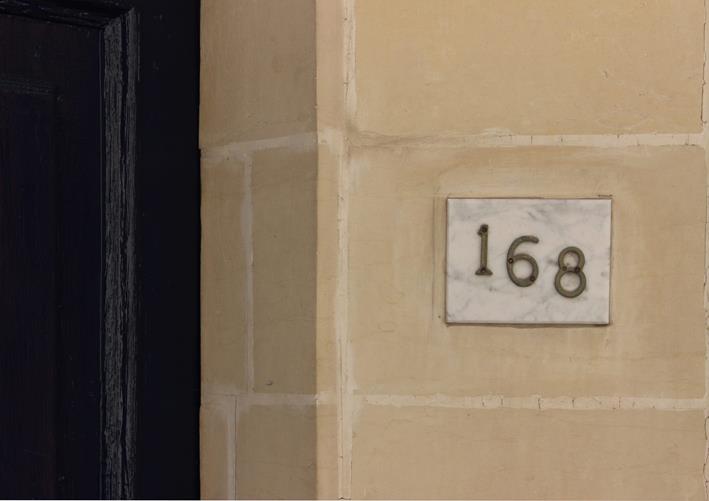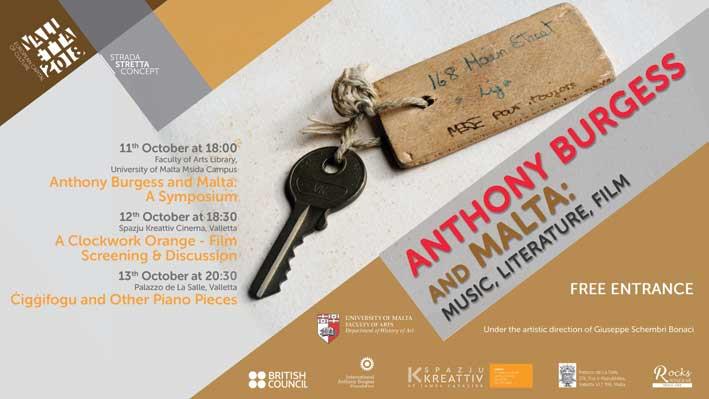'It was the afternoon of my eighty-first birthday, and I was in bed with my catamite when Ali announced that the archbishop had come to see me', the first line of Anthony Burgess' novel Earthly Powers, frequently referred to as his greatest masterpiece. Living in Lija, Kenneth Toomey, the novel's eighty-one-year-old protagonist, inhabits the street in which Burgess himself resided during his short stay in Malta.
Following the death of his first wife Lynne, the British writer travelled to Malta in August 1968 accompanied by his second wife Liana Macellari. The two lived in Number 168, Triq il-Kbira, which Burgess himself described as a 'rather fine house built in 1798, the year of Napoleon's invasion'. It was here that Anthony Burgess concluded his biography Shakespeare and began writing his 1971 novel MF.

Even after his death in 1993, Burgess is still widely remembered for his skill as a novelist as a result of his prolific literary career. Nevertheless, Burgess was also a composer, writing a large number of musical pieces and even stating that he wished people to think of him 'as a musician who writes novels, instead of a novelist who writes music on the side'. Indeed, it is not solely in his novels that Burgess refers to his experience living in the Maltese town of Lija. In Earthly Powers, Lija is presented as the conservative neighbourhood in which the protagonist lives; however, more positively, the Maltese town also inspired Burgess' in his musical compositions with a piano score entitled Ġigġifogu written about the Lija fireworks. Music seems to have been an essential part of Anthony Burgess' life, as well as his artistry.
Nevertheless, Burgess' stay in Lija was cut short due to government censorship which interfered with his career as writer and critic and following his lecture on 'Obscenity and the Arts' delivered at the University of Malta's Science Lecture Theatre to a large, scrutinising crowd in 1970 (later transcribed and published by the Malta Library Association in 1973), the Burgesses left Malta and settled in Bracciano, Italy. The Maltese Government confiscated Burgess' house in April 1974; however, according to Burgess in his memoirs You've Had Your Time, the house was eventually 'de-confiscated' due to the publicity following his correspondence with the New York Times.
2017 marks a century since the birth of Burgess in 1917. Born John Anthony Burgess Wilson in Manchester, he published his first novel, Time for a Tiger in 1956. His best-known novel, A Clockwork Orange, follows Alex, the protagonist who indulges in violence and crime along with his gang. Exploring issues of state power and abuses of that power, Alex is caught by state authorities who make use of the Ludovico Technique in an attempt to reform the protagonist and free him of his desire for violence. The novel's popularity increased following its adaptation into film by Stanley Kubrick in 1971. Upon its release Kubrick's adaptation resulted in outrage as well as applause amongst viewers and critics alike with Kubrick even withdrawing the film's release in the UK. While the novel initially appeared to align itself with the poignant and provocative dystopian satires of Orwell's 1984 and Huxley's Brave New World, Kubrick's critics have protested against the anarchy and glorified violence depicted in the film. Kubrick's adaptation follows the US publication of Burgess' work which omits the final chapter of the novel.

Prof. Andrew Biswell, lecturer, critic, director of the International Anthony Burgess Foundation, explains in his biographical study, The Real Life of Anthony Burgess, that the novelist was concerned with the outbreak of public anger at Kubrick's film. Prof. Biswell, who has carried out research and published various articles on Burgess and his works since 1995, explains that Burgess was concerned with the notions of free will and human responsibility, a concern which is continually reflected in his novel as the Chaplain asks; 'is a man who chooses the bad perhaps in some way better than a man who has the good imposed upon him?'
Nearly 50 years since his short stay in Malta, the issues and moral questions raised and explored by Burgess in his articles, lectures, and novels remain as pointed and provocative today as they were when Burgess first wrote them. In order to commemorate one of the most prolific writers of the twentieth century, the Department of Art and Art History at the University of Malta together with the Strada Stretta Concept, under the auspices of the Valletta 2018 Foundation, will be collaborating with the International Anthony Burgess Foundation and the Department of English in upcoming 2017 Anthony Burgess Centenary Celebrations. The three-day event, Anthony Burgess and Malta: Music, Literature, Film, will include a symposium and discussion by Prof. Andrew Biswell, Dr Giuseppe Schembri Bonaci, and Prof. Ivan Callus, who will present their research on Burgess' Malta experience on the 11th of October at 18:00 at the Faculty of Arts Library at the University of Malta. A screening of Kubrick's A Clockwork Orange will be held at 19:00 at the Spazju Kreattiv Cinema in Valletta the following day. On Friday 13 October pianist and composer Tom Armitage will be performing the world-premiere of piano scores composed by Burgess, including Ġigġifogu and an untitled piece also composed in Malta at 8.30pm at Palazzo de La Salle in Valletta. All events are free of charge.
For more information, check out the event page on Facebook: Anthony Burgess and Malta: Music, Literature, Film or search for the event on the Valletta 2018 Foundation's website.